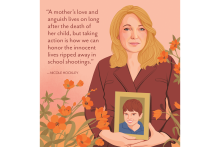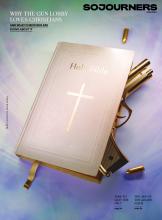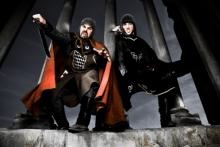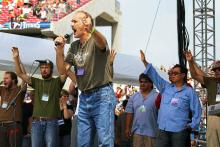theocracy

ONE DOESN'T NEED Margaret Atwood’s dystopian fiction to see the frightening potential of theocracy. In this issue, writer René Ostberg tells a chilling story of a malign collusion of church and state — in this case, the Irish Catholic Church and the newly formed Irish state of the 1920s. Together, the two institutions acted as morality police, imprisoning women and girls for the “crime” of becoming pregnant out of wedlock — as Ostberg puts it, “for transgressing Catholic Ireland’s moral and class codes.” More than 10,000 Irish women and girls were incarcerated in so-called Magdalene laundries run by Catholic religious orders with state funding, the last of which wasn’t closed until 1996.

ALMOST HALF OF Americans believe the United States should be a “Christian nation,” according to a survey this fall, and a significant percentage say that the Bible should have more sway than the will of the people in shaping U.S. laws when the two conflict. The opinions expressed in the October survey by the Pew Research Center break along party lines, with three-quarters of Republicans (and less than half of Democrats) saying the founders intended for the country to be a Christian nation, and 4 in 10 Republicans (compared to 16 percent of Democrats) believing that the Bible, rather than majority rule, should be the source of the nation’s laws. (A similar percentage of Republicans — 39 percent — surveyed by the American Enterprise Institute in 2021 said that political violence may be necessary to “protect America.”) This summer, Republican Rep. Marjorie Taylor Greene declared that “We need to be the party of nationalism, and I’m a Christian, and I say it proudly, we should be Christian nationalists.”
While it may seem that a portion of one of the country’s two main parties has wandered off to never-never land, the survey doesn’t mean the country is heading toward theocracy—yet. Most of the respondents who say the U.S. should be a Christian nation, according to Pew, “are thinking of some definition of the term other than a government-imposed theocracy.” (A small minority, in the words of one respondent, view Christian nationalism as a way “to use the government to impose an extreme, fringe version of Christianity on everyone in the nation, regardless of others’ religious views. They are no different than al-Qaida or the Taliban.”)

A fringe Christian ideology helped stoke an out-of-control gun culture. People of faith are working to take back the conversation.

In November of 1963, C. S. “Jack” Lewis knew he was dying. The Irish-born literary scholar, children’s author, and Christian apologist had come out of a coma in July, only to be diagnosed with end-stage renal failure. He retired from his post at Cambridge University, choosing to die at home in the Kilns, where he lived with his brother, Major Warren (“Warnie”) Lewis.
On Friday, Nov. 22, he retired to his bedroom after lunch. At 4:30 p.m. GMT he took some tea. An hour and a half later, Warnie heard a crash and discovered Jack unconscious. Within three or four minutes, he was dead, exactly one week shy of his 65th birthday.
A few minutes later (11:39 a.m. CST), Air Force One touched down at Love Field in Dallas, Texas, as a motorcade prepared to take President John F. Kennedy and his wife Jacqueline, along with their entourage, to the Dallas Business and Trade Mart. But the motorcade never arrived at its destination.
After the president suffered mortal gunshot wounds to the head at 12:30 p.m., his limousine rerouted to Parkland Memorial Hospital where the 46-year-old president was dead upon arrival.

The Democratic sweep of Congress in 2006 and President Obama's election in 2008 convinced many people the religious right had been defeated and discredited. They believed it was time to "move on," a ubiquitous but dangerous phrase that often blinds people to unpleasant realities.
The truth, however, is that the religious right, Christian Reconstructionism and Dominionism have never gone away. And now they're back — "big time," as Dick Cheney might say.
In the 2012 presidential election, the Christocrats are out in force on many fronts: trying to eliminate prenatal care and all forms of contraception; defunding breast cancer screening; opposing civil rights for same-sex couples; contesting evolution and substituting creationism in public schools; denying the reality of global climate change; and discrediting the "lame stream media."

Though I treasure my Pentecostal heritage, these days I feel like an outsider looking in, because though it started out as a pacifist movement in the early 20th century, today Pentecostalism (at least in America) is largely known as a religion that spawns extremist movements that trumpet militarism and bigotry.
Chief exhibit: The Call
Founded by Lou Engle, The Call is a movement that regularly holds massive prayer events in stadiums across the country. Engle is part of a network called the New Apostolic Reformation, which believes that God is raising up an end-times army of apostles and prophets to take over earthly governments before Jesus comes back.
A few of its prominent leaders are Peter Wagner, Cindy Jacobs, Rick Joyner, and Mike Bickle. Though the end-times theology of these individuals may vary, the underlying principle that binds them together is the idea that Christians are called to dominate earthly governments and civil society, and that apostles and prophets are supposed to pave the way to make that happen.